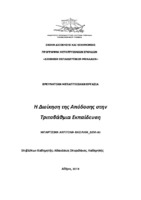| dc.contributor.advisor | Σπυριδάκος, Αθανάσιος | |
| dc.contributor.author | Μπαρτζώκη, Αντιγόνη Βασιλική | |
| dc.date.accessioned | 2018-02-13T10:41:14Z | |
| dc.date.available | 2018-02-13T10:41:14Z | |
| dc.date.issued | 2018 | |
| dc.identifier.uri | http://okeanis.lib2.uniwa.gr/xmlui/handle/123456789/4087 | |
| dc.description.abstract | Κάθε Ανώτατο Εκπαιδευτικό Ίδρυμα είναι εκπαιδευτικός οργανισμός που χρήζει την ανάγκη συντονισμού μιας ιδιαίτερης στρατηγικής διοίκησης, αφού έχει ως καταναλωτές των παραγόμενων υπηρεσιών του (εσωτερικούς πελάτες) τους φοιτητές/κοινωνία και εξωτερικούς πελάτες το ίδιο το Κράτος. Στην παρούσα διπλωματική εργασία, αναλύεται ο χρησιμότητα της Διοίκησης της Απόδοσης, η σύνδεσή της με την αξιολόγηση και τον καθορισμό στόχων και ικανών στρατηγικών διοίκησης για την εξέλιξη ενός Ανωτάτου Εκπαιδευτικού Ιδρύματος (εκπαιδευτικός οργανισμός). Άλλωστε η Διοίκηση της Απόδοσης είναι μια συνεχής αυτό-ανανεούμενη διαδικασία επικοινωνίας και ανατροφοδότησης μεταξύ δυο συμβαλλόμενων μερών, ενός επόπτη και ενός υπαλλήλου, με απώτερο στόχο την επίτευξη των στρατηγικών στόχων ενός οργανισμού. Για την επίτευξη των στρατηγικών αυτών στόχων, σύμφωνα με τον πατέρας της «οργανωσιακής μάθησης» (organizational learning), Chris Argyris, οι άνθρωποι εξομοιώνουν τις πληροφορίες πιο διεξοδικά καθώς ο τρόπος συμπεριφοράς τους μέσα οργανισμούς είναι διαφορετικός από τις ιδέες που υποστηρίζουν. Ο ίδιος χαρακτήρισε τις δύο όψεις αυτής της διάκρισης σε «θεωρία σε χρήση», για αυτό που κάνουμε και «ενστερισμένη θεωρία», για αυτό που λέμε. Οι συμπεριφορές μας - οι θεωρίες που χρησιμοποιούνται - οδηγούνται μόνο εν μέρει από τις θεωρίες που εμπλέκονται, και σε μεγαλύτερο βαθμό από τους φόβους, την υπερηφάνεια, τα εδραιωμένα πρότυπα και την ανάγκη συμμόρφωσης. | el |
| dc.format.extent | 90 | el |
| dc.language.iso | el | el |
| dc.publisher | Α.Ε.Ι. Πειραιά Τ.Τ. | el |
| dc.rights | Αναφορά Δημιουργού-Μη Εμπορική Χρήση-Όχι Παράγωγα Έργα 3.0 Ελλάδα | * |
| dc.rights.uri | http://creativecommons.org/licenses/by-nc-nd/3.0/gr/ | * |
| dc.subject | TPSH::Διοίκηση και Οργάνωση | el |
| dc.subject | TPSH::Κοινωνικές Επιστήμες::Εκπαίδευση | el |
| dc.title | Η διοίκηση της απόδοσης στην τριτοβάθμια εκπαίδευση | el |
| dc.title.alternative | Performance management in higher education | el |
| dc.type | Μεταπτυχιακή εργασία | el |
| dc.contributor.committee | Ψαρομήλιγκος, Ιωάννης | |
| dc.contributor.committee | Σαλμόν, Ιωάννης | |
| dc.contributor.master | Διοίκηση Εκπαιδευτικών Μονάδων | el |
| dc.subject.keyword | Θεωρία σε χρήση | el |
| dc.subject.keyword | Στρατηγικός σχεδιασμός | el |
| dc.subject.keyword | Τριτοβάθμια εκπαίδευση | el |
| dc.subject.keyword | Επιχειρησιακός σχεδιασμός | el |
| dc.subject.keyword | Ενστερνισμένη θεωρία | el |
| dc.subject.keyword | Μοντέλα αξιολόγησης | el |
| dc.subject.keyword | Διοίκηση απόδοσης | el |
| dc.subject.keyword | Chris Argyris | el |
| dc.subject.keyword | Απόδοση εργαζομένων | el |
| dc.subject.keyword | Οργανωσιακή μάθηση | el |
| dc.description.abstracttranslated | Performance Management is a continuous, self-renewing process of communication and feedback between two parties, a supervisor and an employee, with the ultimate goal of achieving the strategic goals of an organization. On the other hand, a Higher Education Institution is an educational organization which needs to coordinate in a particular management strategy. Furthermore, it has as consumers of the produced services (internal customers) the students / society and external customers the State itself. In this dissertation, we analyze the beneficial of Performance Management, its link with the evaluation and the definition of goals and competent management strategies for the development of a Higher Educational Institution (educational organization). In order to achieve these strategic goals, Chris Argyris supports that people assimilate information more thoroughly as their behavior in organizations is different from the ideas they support. He described that there is two aspects of this distinction: 'theory in use', for what we do and 'embedded theory' for what we are saying. Our attitudes - the theories used - are only partly driven by the theories involved, and to a greater extent by fears, pride, established standards and the need for compliance. | el |


